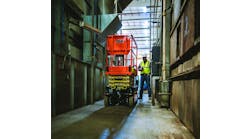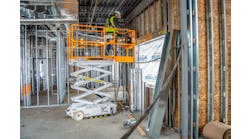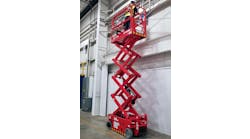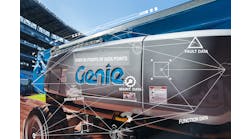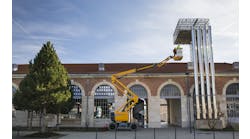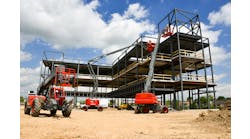Not long after settling in as president of Terex Aerial Work Platforms, Tim Ford, like everybody else in the construction industry, found himself faced with the challenge of navigating the most severe recession anyone can remember. RER’s Michael Roth recently sat down with Ford to discuss the challenges ahead.
RER: How does the outlook look for the foreseeable future?
Ford: As you know, we’ve had a tough last couple of quarters and for the rest of 2009 we are likely to see the same story. Rental companies are managing fleet efficiently — which is healthy for the industry, but tough on equipment manufacturers.
You had a sense in advance that a downturn would be coming, didn’t you?
Many people warned me that a downturn would happen, but I don’t think anybody ever anticipated it would be this severe. In many ways we have had the perfect storm with a global recession, very tight credit, a near stoppage in both commercial and residential construction and the banking debacle. Banks aren’t ready yet to take risk on a new project, and without financing, the cycle will continue. Governments around the world are trying to pull us out of this with stimulus funding, but until we get the banking situation figured out, it is my view that this will continue for a while. Getting TARP money repaid, as is now beginning to happen, is a positive sign.
You had ramped up production all over the world and now you have to shut it down.
We ramped up production by adding shifts, faster production cycle times and sharing manufacturing facilities with other Terex businesses, but we did not add to our manufacturing footprint. Ramping down has been painful because it has come by reducing our workforce, asking team members to work shorter hours and dramatically reducing our production rates. At the same time we are doing this, we have committed to major investments in the U.S. and Europe for larger, better parts and distribution centers and we are opening service center locations in growth areas around the world. We are still committed to building our previously announced plant in China, and our team has been on the ground working project since last fall. We expect Asia in general, and China specifically, to continue to grow and being there is the right decision for the long term. So we continue on with that investment.
Even though they are having a recession there as well?
I was just recently in China reviewing our progress there. While most developed markets are struggling, developing markets are still doing okay. Given the global recession, we’ve slowed down the pace of our investment in China. We are trying to — as best we can — time the start up of that facility with a volume pick up in other markets around the world. That’s the theory anyway — but it’s a challenge. This economic downturn is more severe than anything I’ve seen in my lifetime and I suspect most others have seen in their careers as well.
Nobody really saw it coming.
I don’t know if it’s fair to say that nobody saw it coming, but I would guess most people — myself included — couldn’t have predicted the severity of it. What has proven to be the most challenging is the velocity with which things slowed down. To illustrate my point, at the end of the second quarter last year, our trailing 12-month sales were roughly $2.5 billion. Our fourth quarter 2008 and first quarter 2009 revenue, extrapolated over a full year, would yield less than half that revenue. It’s amazing how fast that fell off. And it’s not just with aerials. The only industries facing more turmoil that I can think of are automotive or banking.
Any particular long term plans in the product area?
Unfortunately, we’ve had to dramatically reduce our work force, but we’ve worked hard to minimize the impact on our engineering and product management organizations. I think it’s vital that we continue to work on new products to be ready for the rebound. A key strategic change for us will be to really work hard at developing products tailored to local needs, construction methods and compliance standards based on a global platform. While we’re working on new products, we are also focused on making sure we have the right cost to be competitive with customer expectations.
We’re trying to think about products from a local point of view. For example, aerial booms in China may end up being something very different from what we’ve historically thought they should be. We need to be careful not to think about product design and development from a U.S. mindset, rather from the local application perspective and work back from there. It takes time to develop that capability, but this is what being a global enterprise is all about.
It means understand the local culture, customs and dynamics. It means understanding — really understanding — the application and environment in which the products will be used and then applying that learning in the final design. We need to be sure we are listening to what is important to people, in the way they want to be heard, and that is going to be different in different markets around the world.
You’ve had to reduce your sales force?
Very modestly. In fact, in certain cases, we’re trying to add more feet on the street. You are always looking at the skill set of your organization and making performance based decisions. Where we’ve had to make reductions, we’ve tried to keep them in the administrative and support areas. The actions we’ve had to take are more rifle shot than shotgun, if that makes sense.
Have you seen casualties in the dealer network?
To date we really haven’t, though I suspect the longer this lingers on, the higher the probability we will see some. We’re watching this is by paying close attention to our accounts receivable. We’ve been pretty tight in terms of managing credit, which has possibly cost us a point or two of market share, but as a result we’ve not had any major write downs. Some of our competitors have taken reserves for bad debt because they used terms as a way to sell more equipment. We don’t believe that is a good idea in this environment and we’re willing to let others take that risk.
The flip side of that coin is managing your supply network. We are paying equal attention to the health of our supplier base as we are to our customers. It would be equally bad to have an important supplier go under.
While our rental customers are wisely watching their balance sheets and managing their risk, with such little volume in this market, it is very plausible to me that a year from today some manufacturers selling into the rental base will have a different name plate on the front door or won’t be here at all. I don’t know who that would be and I don’t know what categories they’d be in, but it’s inevitable that downturn caught some companies in the vortex and they will not be able to survive.
Might there be some acquisition opportunities for Terex?
Terex has always been acquisitive by nature, so the short answer to that question is yes, but we’re managing cash closely. Unless the opportunity is so unique that we’d say “this is a once-in-a lifetime opportunity,” we’d be very reluctant to step into a large deal right now because we don’t know how long this economic down cycle will last. In my experience, you usually have some idea of where the market is headed next but sitting here in early June, I still can’t call the second quarter. That’s not particularly comfortable. In my 25 years of experience, I’ve never been in a situation where you’re that near term and you don’t have any visibility on what’s going to happen next.
Much less the third quarter!
Exactly. So getting out and doing acquisitions will happen once we find bottom and travel across for a while. I think you’ll start to see some companies that are more acquisitive begin to look at opportunities, but you don’t want a whole lot of debt on your balance sheet right now.
In closing, I would add that despite the dark horizon and continued uncertainty, I believe we will emerge from this downturn a better and healthier industry. While manufacturers compete vigorously to sell equipment and rental houses are trying win with their customers, it is in our collective interest to make decisions for the long term. Those companies that serve customers well, pay attention to the details and manage risk appropriately will win. When it’s all said and done, the economy will recover, our industry will survive and I believe Terex will be positioned to thrive.


